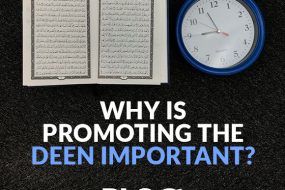
Keeping in line with my previous article, I am going to continue on the theme of proactive psychological self-care as I believe it is massively important in preventing (and managing) psychological distress, as well as the physical ailments that may accompany this as a result of poor self-care. Since there are so many different ways to go about this and everyone has their own preferences, and indeed even prefer different methods during different kinds of stressors, I will work through various options in each article, insha’Allah.
This article is going to focus on mindfulness.
As a relatively new form of therapy introduced in the field of psychology, it is something that anyone can try from the comfort of their own home. Mindfulness is a term that describes the state of paying attention to the present, in a non-judgmental and accepting way.
To begin with, let’s look at the theory behind the elements of mindfulness and how they are useful to us from an Islamic perspective. In terms of non-judgemental, acceptance of our thoughts, we may first wonder about the negative and even haram thoughts that flood our mind. Should we really be accepting and non-judgmental of them? We all have them at some point and spending so much time ruminating on them and focusing on them in a negative way will lead us to become distressed and this is indeed the cause of severe psychological disturbance in many people. The importance in Islam, however, is that we don’t act on such thoughts.
Narrated from Abu Hurayrah![]() , that the Prophet
, that the Prophet ![]() said: “Allah, may He be glorified and exalted, will forgive my ummah for whatever crosses their minds so long as they do not act upon it or speak of it.” 1
said: “Allah, may He be glorified and exalted, will forgive my ummah for whatever crosses their minds so long as they do not act upon it or speak of it.” 1 
By just accepting them as thoughts and not judging them, we are able to let them pass more easily. This is how mindfulness is very useful too, because it gives us this control over our thoughts and by taking care of our psychological well-being, we will be more stable and therefore, less likely to act out these thoughts.
Thinking about attention; all too often, we fall into this trap of doing things on auto pilot, mindlessly carrying out tasks. This goes for our thoughts too; thoughts come into our mind and we don’t pay full attention to them. Mindfulness is about really focusing on them and parting from the autopilot mode; from which we are probably all guilty of turning on in this fast paced world.
In terms of remaining focused on the present, the Prophet Muhammad![]() , warned us about putting too much effort on ruminating over ‘what if’s.
, warned us about putting too much effort on ruminating over ‘what if’s.
It was narrated that Abu Hurayrah![]() said: The Messenger of Allah
said: The Messenger of Allah ![]() said: “The strong believer is better and more beloved to Allah than the weak believer, although both are good. Strive to do that which will benefit you and seek the help of Allah, and do not feel helpless. If anything befalls you, do not say ‘If only I had done (such and such), the such and such would have happened,’ rather say: ‘Allah has decreed and what He wills He does,’ for ‘if only’ opens the door to the work of the shaytaan.” 2.
said: “The strong believer is better and more beloved to Allah than the weak believer, although both are good. Strive to do that which will benefit you and seek the help of Allah, and do not feel helpless. If anything befalls you, do not say ‘If only I had done (such and such), the such and such would have happened,’ rather say: ‘Allah has decreed and what He wills He does,’ for ‘if only’ opens the door to the work of the shaytaan.” 2.
Mindfulness is a great way of preventing us from doing this. Whilst mindfulness is not necessarily intended as a distraction exercise (although it almost is at times), it will train you to stop ruminating over the ‘what if’s of the past and future and so, is a great way of preventing us from falling into Shaytan’s trap. Simply telling people to stop ruminating over the past or stop worrying about what the future will bring is not easy, because, in fact, the more you try to stop thinking about something, the more you think about it! This is where mindfulness exercises come in. Mindfulness exercises will help you to take control of these thoughts and subsequent feelings with a focus on the present.
There are many mindfulness exercises available to try that can help to put this into practice and help people to take control of their emotions in a positive way. For the purposes of this article, I have selected a couple that anyone can do, regardless of how busy you are and what kind of environment you live in. These are globally applicable and really illustrate what mindfulness is and how you can implement it.
Mindful Activities
I really like this because it’s something that you don’t need to make extra time for, which is really handy for anyone, even in the busiest of times. So for those of you right now who are saying that you simply don’t have time to spare to do these kinds of exercises, this is for you. It is also a very proactive way of taking care of your psychological well-being, since it is just integrated into everyday tasks, helping you to maintain this calm sense of mind as much as possible and therefore, you will be less likely to elicit irrational responses if and when you face a stressful situation.
If you are actually going through a stressful time, it helps to bring you back to the present again, helping you to quit focusing on the ‘what if’s of the past or future. It can be helpful to make a mindful habit when doing seemingly boring household tasks for example. All too often when completing such tasks our minds are taken away elsewhere, ruminating over negative things. Adding mindfulness to these tasks can help to break you away from this kind of thinking, bringing you right back to the present moment, by focusing literally on the task at hand, embracing your senses to the fullest. You can begin by being grateful that you even have these senses, or, if not all, then for the ones that you do have, because there are also many who do not have the faculty of hearing or seeing, for example, so don’t get to experience this.
“Look to those who are lower than you (i.e., those who possess less than you) and do not look to those higher than you; this will make you appreciate the bounties of Allah upon you.” 3
Taking washing up as an example task;one that is typically completed in this ‘mindless’ way. Sure, you can hear the water running, you can feel the sponge, and you can see your plates are now clean, but are really paying attention to this? Are you really paying full attention to the experiences of all your senses? In this exercise we will do just that.
Focusing on your sense of touch, take note of the way the sponge feels on your hands, perhaps it soft, or perhaps it’s a rough scourer. How does the water feel running over your skin? And the bubbles? How the texture of the sponge changes as it fills with soap and water.
How about your hearing? Pay attention to the sounds of the water running and how it changes when it hits the plate and then the sink, the squeaky sound of the clean plate, the clinking sound when it makes contact with other utensils as you put it aside to dry.
Your sight: See the way the plates shine when they are clean, see the rainbow colors move and change in the bubbles. Actually pay attention to any patterns on the utensils. You see them everyday, but you probably don’t actually pay that much attention to them. What colors and shapes are used?
Can you smell the soap you are using? Perhaps it has a specific smell? It might feel like quite a silly and weird thing to do, it’s just washing up, right? But I would urge you to give it a go. If you’re fortunate enough to have a dishwasher, you could either try washing by hand if you have the time, or apply the same principles to another similar task that you have to do, perhaps whilst taking a shower, for example. The point is to just notice and experience all of your available senses.
Whilst not meant as a relaxation exercise as such, mindfulness exercises can be incredibly relaxing, even in the noisiest of settings. Classically, you might think that such exercises should be conducted in quiet and peaceful environments, but this is not necessarily the case. If you have the chance to seclude yourself in this kind of environment, then this is great and ideal, but I know that there are also many people who do not have this. Perhaps, you live in a busy built up area with lots of traffic and little in the way of natural scenery, so there is never complete quiet or visions of absolute beauty, but you can still benefit from mindfulness exercises in the same way since the focus is really on being in the present, focusing on your thoughts and senses, so having these ideal peaceful serene surroundings is not entirely necessary to engage in such activities.
Emotions:
The focus on the previous exercise was solely on the physical experience, so what about the emotions? We can apply these same principles to emotions too. For this, it really is a requirement to be somewhere where you won’t be disturbed for 5 or 10 minutes, so perhaps bedtime would be an ideal time as a task to do when you are lying in bed. It also gives you a chance to get a positive control on your thoughts so you don’t lose sleep ruminating over them. It’s also useful to draw ourselves to this beautiful reminder about the importance and rewards of doing such before sleeping. A similar example is given in the following hadith and mindfulness techniques can be a useful way to assist in achieving this.
The Prophet ![]() , while sitting in the mosque with the Companions (radiAllahuanhum), pointed out a person who entered the mosque as being of those who would enter Jannah. He did this for 3 days, and every time, it was the same person who entered the mosque. Abdullah bin ‘Amr
, while sitting in the mosque with the Companions (radiAllahuanhum), pointed out a person who entered the mosque as being of those who would enter Jannah. He did this for 3 days, and every time, it was the same person who entered the mosque. Abdullah bin ‘Amr ![]() wanted to know what quality this man possessed that made the Prophet
wanted to know what quality this man possessed that made the Prophet ![]() say that about him, so he spent three nights with that man. He did not notice that the man prayed the optional night prayers during any of these nights, but if he woke up during the night, he would simply mention Allah. So before he left, he had to ask him what he did that was so special that the Prophet
say that about him, so he spent three nights with that man. He did not notice that the man prayed the optional night prayers during any of these nights, but if he woke up during the night, he would simply mention Allah. So before he left, he had to ask him what he did that was so special that the Prophet ![]() identified him as a man of Jannah. The man replied: “My deeds are nothing more than what you saw”. When Abdullah
identified him as a man of Jannah. The man replied: “My deeds are nothing more than what you saw”. When Abdullah![]() left, he
left, he ![]() called him back in and said: “My deeds are nothing more than what you saw, but the only thing I do is that I do not hold any grudge against any Muslim or envy anyone for what bounties Allah has granted them”; thereupon ‘Abdullah Ibn ‘Amr
called him back in and said: “My deeds are nothing more than what you saw, but the only thing I do is that I do not hold any grudge against any Muslim or envy anyone for what bounties Allah has granted them”; thereupon ‘Abdullah Ibn ‘Amr ![]() said to him: “This difficult quality to obtain is what granted you this rank”. 4
said to him: “This difficult quality to obtain is what granted you this rank”. 4
Settle on the most prominent emotion that you are feeling… If you could give it a color, what would it be? Take time to focus on this emotion as an objective shape. What shape, size and color would it be? If you can’t imagine it as a shape, then simply imagine the letters of the emotion and watch them floating around in the air and imagine what shape, size and colors the letters are. Take a few seconds/minutes to focus on the shape or letters. If your mind wanders, then just bring your attention back to your breathing before trying again. As you focus on this mental image, notice any thoughts that come into your mind, particularly any judgements or criticisms of this emotion. What are you telling yourself about this emotion? What other words are attached to this image? Focus on this for a few seconds/minutes. Then, as you continue to breathe in and out, imagine that your breath is like a small breeze gently blowing these judgements away from the emotion, leaving you viewing the mental image of the emotion from a neutral position, just noticing the shape of the emotion, just noticing the presence of it.
Here, we are focusing on the use of mindfulness in a proactive way, i.e. integrating into daily life to maintain this healthy state of mind that ultimately helps us approach stressful situations in a more healthy manner. However, it can be used in a reactive way also, simply as a means to take 5 to 10 minutes out from the stressful task or situation to complete a mindfulness exercise and really bring things back into perspective.
Again, mindfulness exercises are not something that everyone will find helpful, but I would recommend at least giving it a go, especially as someone, myself, who spent a lot of time reading about it, thinking it all just seemed so silly, wondering how it could possibly be of any use, until I gave it a go.
Please share your thoughts about this article in the comments section below. 🙂








2 replies on “Proactive Stress management (Part II) -The Mindful Muslim”
jazzak Allah khair umu, I found your article really inspiring, may Allah continue to strengthen you…..my question is this how can we practice this mindfulness in our daily salah..pls help us with that…Asalaamu alaykum waramatulahi wabarakatuhu….. from Lagos,Nigeria.
[…] Read Part II here! […]